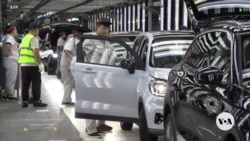The European Union is bracing for retaliation from China after the bloc voted last week to impose tariffs on the import of Chinese electric vehicles, or EVs, amid speculation that Beijing could seek to target individual European countries that voted for the measures.
The EU is divided on the issue, with 10 member states in favor in Friday’s vote, five countries voting against the measures and 12 abstaining.
After the vote, China's Commerce Ministry said it opposed the planned tariffs, calling them "unfair, non-compliant and unreasonable."
Cognac
France is among the countries that pushed for the EU to adopt the tariffs. Makers of French cognac, a type of brandy, fear that Beijing will now seek to target their product, after China launched an anti-dumping probe earlier this year.
That investigation concluded in August that dumping had occurred on the Chinese market, but Beijing chose not to impose any tariffs at that stage, a decision widely seen as an attempt to defuse tensions with Europe.
The EU’s decision to impose EV tariffs could provoke China into reversing its decision, according to Anthony Brun, president of General Union of Cognac Producers.
“We are of course quite worried, because today, China is our second-biggest market. It represents more than one-third of our volumes that are exported for more than 250 years now. Knowing that we will potentially be imposed with a tax of around 40% tomorrow — that would potentially mean the disappearance of this market, because our competitors will not be targeted with the same tax,” Brun told the Reuters news agency, adding that the French government had seemingly chosen to sacrifice his industry.
“Because France is leading the way on this policy, they will seek to target a product that concerns France exclusively,” he said.
German cars
Germany, the EU’s biggest economy, voted against the tariffs. German carmakers also fear Beijing’s retaliation.
“The European automotive industry — and especially Germany’s — lives from exports. Seventy percent of our jobs depend on it. The current decision could lead to new trade conflicts, to a spiral of protectionism, with tariffs being responded to with further tariffs. And that is a disadvantage for us,” said Hildegard Mueller, president of the German Association of the Automotive Industry, in an interview with Reuters.
China has already opened investigations into the import of European pork and dairy products, which could disproportionately hit some EU member states that voted in favor of the electric vehicle tariffs.
'No right to retaliate’
Beijing’s intentions aren’t yet clear, according to Sander Tordoir, a senior economist at the Centre for European Reform.
“The European Commission followed the World Trade Organization’s rules in designing the countervailing duties on Chinese electric vehicles,” Tordoir wrote in an email to VOA. “As a result, China in principle has no right to retaliate, but that does not mean Beijing won’t anyway. Berlin’s very visible opposition to the tariffs means Beijing may target its retaliation on exports of, say, French brandy or Spanish pork, not German cars. But one cannot exclude that China will anyway discriminate against EU or German-built cars.”
In a statement issued after Friday’s EU vote, the Chinese Ministry of Commerce pledged to “take all measures” to safeguard Chinese companies — but added that negotiations would continue.
Negotiations
Both Brussels and Beijing are keen to find a compromise — and both want to avoid a trade war, according to Julia Poliscanova of the Transport and Environment policy research group in Brussels, which advocates for greener transport.
“We shouldn’t underestimate how important the European market is also for China. Ultimately, the EU market provides the opportunity for the bulk of Chinese EV exports,” Poliscanova said. “So, China needs the EU as much as we need China. And that's why I think there will be some sort of ‘friendlier’ retaliation or friendlier actions as such.
“Given the huge oversupply or overcapacity in China and the desire and the need for a lot of Chinese companies — battery makers, EV makers — to go global, I believe the European market will still be very attractive to them,” she said.
Economist Tordoir is less optimistic.
“It is hard to judge how likely negotiations will succeed. By pressing ahead with the EV tariffs in the interim, the EU has shown that it is serious,” he said. “Reportedly under discussion is an idea to set voluntary minimum prices — a kind of surcharge — to offset the market-distorting Chinese subsidies on electric vehicles. But it is not clear how these would be monitored, enforced or how the scheme would be made WTO-compliant, which the EU clearly cares about.”
WTO rules
The EU argues that the EV tariffs will protect the European car industry, which it says employs 14 million people across the bloc.
“The purpose has been to establish, or rather re-establish, a level playing field so that the goals pertaining to electric vehicles and overall green goals, let's say for the EU, can be achieved in a fair way,” European Commission spokesperson Olof Gill told reporters Friday. “We do not and we never have wanted to impose tariffs in this case for the sake of imposing tariffs. What we want is to remove the injurious subsidization.”
Brussels believes the EV tariffs don’t breach World Trade Organization or WTO rules.
“The tariffs are very differentiated [according] to the company and based on the individual levels of subsidization,” auto industry analyst Poliscanova said. “I think that is what makes those tariffs actually quite compatible from what I understand with WTO rules.”
US tariffs
The United States in August quadrupled its tariff on Chinese electric vehicle imports to 100%. U.S. Trade Representative Katherine Tai said such measures are sometimes necessary.
“The goals that we're trying to accomplish: One is to level the playing field for our industries and our workers. The second one is to ensure that the United States economy, for our workers and our producers, can stay vibrant, that especially when it comes to critical industries that we know are strategic for our collective future, that the United States can continue to be a producer, a player, and that the jobs in these industries will be good jobs,” Tai told Agence France-Presse on October 3.
Canada also imposed a 100% tariff on Chinese EVs from the beginning of October, alongside 25% import tariffs on steel and aluminum. Beijing has filed an ongoing appeal against the Canadian measures at the World Trade Organization.







